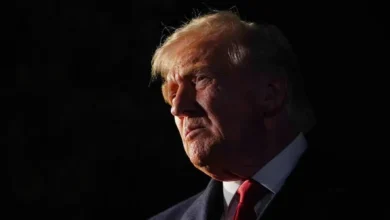
The Patriotism Gauntlet: Trump’s Vow to Revoke De Niro’s Citizenship Is More Than Just an Insult
In the turbulent arena of American politics, the line between celebrity feud and a genuine threat to democratic norms has become dangerously blurred. The latest and perhaps most jarring example comes from a familiar source: a late-night post from a former president. When Donald Trump declared that legendary actor Robert De Niro was “not a great American” and doubled down on the idea of revoking his citizenship, it transcended the typical name-calling of a culture war spat. It became a chilling declaration, a glimpse into a political philosophy where the power of the state could be wielded as a weapon against personal and political critics.
This confrontation is more than just another headline-grabbing insult. It’s a microcosm of our deeply fractured nation, a high-stakes battle over the very definition of patriotism, and a stark reminder of the fragile nature of free speech when it collides with authoritarian impulses.
The Spark: A Courthouse Confrontation
The fuse for this explosion was lit on the pavement outside the Manhattan courthouse where Donald Trump stood trial. In a move orchestrated by the Biden-Harris campaign, Robert De Niro, an actor known for his tough-guy roles and his increasingly fiery anti-Trump rhetoric, took to a podium to deliver a blistering public condemnation of the former president. Flanked by January 6th first responders, De Niro was not playing a character. His voice shaking with genuine anger, he portrayed Trump as a “clown” and a tyrant who “could destroy the world.”
It was a raw, partisan, and deeply personal attack, designed to get under Trump’s skin and dominate the news cycle. By that measure, it was a resounding success. De Niro’s speech was the quintessential act of a citizen exercising his First Amendment rights to criticize a political figure in the most public way possible. But in doing so, he stepped directly into the line of fire.
The Retaliation: A Threat Beyond the Pale
Trump’s response was swift, predictable in its fury but shocking in its substance. Taking to his Truth Social platform, he unleashed a tirade against the actor, calling him “pathetic and sad” and attacking his career. But then, he crossed a line that few in modern American history have dared to approach. He wrote, “Robert De Niro’s un-American statements…..make him a true enemy of the state.” He then endorsed a supporter’s call for De Niro’s citizenship to be revoked, adding his own commentary that the actor had suffered from “Trump Derangement Syndrome.”
Let’s be clear about the constitutional reality: a president, or a former president, has absolutely no authority to unilaterally revoke the citizenship of a natural-born American. The 14th Amendment guarantees birthright citizenship, a bedrock principle of American law. The circumstances under which a person can lose their citizenship are extraordinarily narrow and almost always involve an individual voluntarily renouncing their allegiance or having committed fraud during a naturalization process.
Trump’s threat, therefore, is not a serious policy proposal. It is something far more insidious. It is the weaponization of a concept. By suggesting that a critic’s citizenship is conditional—that it can be stripped away for holding the “wrong” political views—he is attacking the very foundation of what it means to be an American. Citizenship is not a privilege granted by a ruler for good behavior; it is an inalienable right.
A Battle Over Who Defines a “Great American”
This feud is a symbolic struggle for the soul of American identity. In Trump’s worldview, and that of his supporters, a “great American” is one who aligns with the “America First” movement, who displays a specific brand of patriotism, and who, above all, shows loyalty to him as its leader. In this framework, fierce public dissent is not a sign of a healthy democracy; it is an act of betrayal. Robert De Niro, as a wealthy, liberal, Hollywood actor, is the perfect foil—the embodiment of the “coastal elite” that the MAGA movement defines itself against.
By labeling De Niro an “enemy of the state,” Trump is employing the language of authoritarian regimes, where political opposition is conflated with treason. It’s a rhetorical move designed to dehumanize and delegitimize his critics, casting them as outside the bounds of acceptable American discourse.
Conversely, for De Niro and those who share his views, being a “great American” means actively using one’s platform to stand up against what they see as a clear and present danger to the republic. For them, patriotism is not blind loyalty to a leader, but a fierce allegiance to democratic institutions, the rule of law, and the norms of civil society—all of which they believe Trump threatens. In their view, staying silent in the face of perceived tyranny is the truly un-American act.
This clash is, in essence, a high-stakes form of character assassination, one that echoes the bitter tactics seen in the most contentious defamation lawsuits. Each side is attempting to utterly discredit the other’s standing as a legitimate voice in the American story.
The Chilling Effect on Free Speech
Beyond the philosophical debate, Trump’s threat carries a deeply chilling message for any citizen who dares to speak out. While a figure like Robert De Niro is wealthy and famous enough to withstand such an attack, the intended audience is much broader. The message to the average person is clear: if you criticize me, you are not just my opponent, but an enemy of the country, and you could face consequences beyond just public scorn.
This is how free speech is eroded. It doesn’t always die in a flurry of new laws; it can be slowly suffocated by a culture of fear, where people become hesitant to voice their opinions for fear of personal or professional ruin, or even for fear of being targeted by the state itself.
While presidents have always had contentious relationships with celebrities—one need only look at Richard Nixon’s infamous “enemies list”—Trump’s rhetoric represents a significant and dangerous escalation. He is not just disagreeing with a critic; he is questioning their very right to belong to the nation.
Ultimately, the bitter feud between Donald Trump and Robert De Niro is a tragedy of our times. It’s a spectacle that showcases our profound divisions and the alarming normalization of rhetoric that would have been considered unthinkable just a decade ago. It forces every American to ask themselves a difficult question: In a nation founded on dissent, what does it mean to be a “great American,” and who, if anyone, has the right to make that judgment?



